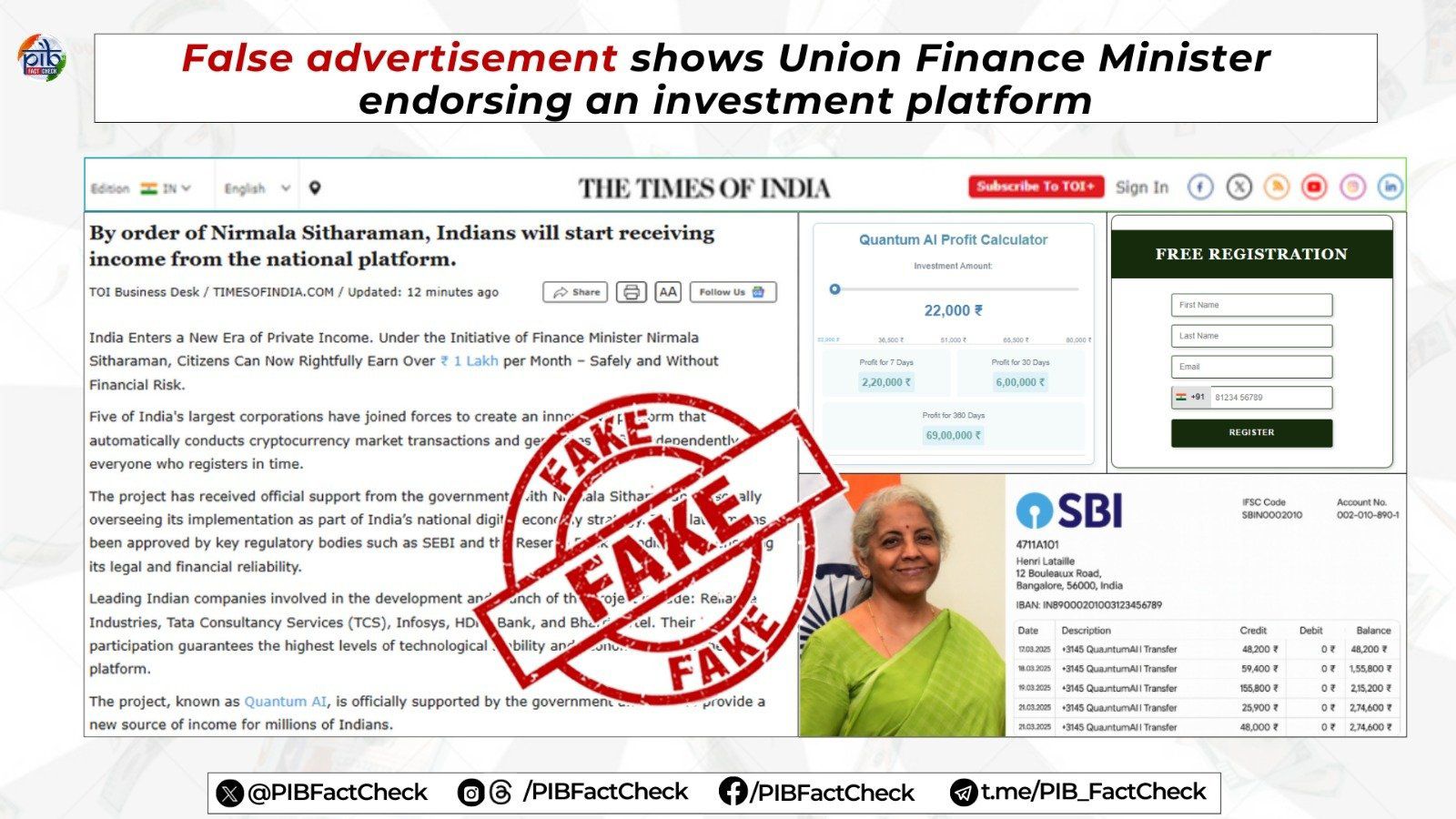 Image Source: X
Image Source: X
In an age of viral misinformation and deepfake technology, a new video circulating on social media has sparked confusion and concern. The clip claims that Union Finance Minister Nirmala Sitharaman has endorsed an investment scheme that can allegedly help citizens earn Rs 60,000 in just 24 hours and up to Rs 5 lakh monthly. The video, which has gained traction on platforms like Facebook and WhatsApp, features what appears to be the Finance Minister promoting a platform called QuantumAl. However, official sources have now confirmed that the video is fake and digitally manipulated.
The Press Information Bureau’s Fact Check team has issued a public warning, urging citizens not to fall prey to such misleading claims. No such scheme has been launched or endorsed by the Finance Minister or the Government of India.
Key Highlights from the Fact Check
A viral video falsely claims Finance Minister Nirmala Sitharaman endorsed a scheme to earn Rs 60,000 in 24 hours
The video promotes a platform called QuantumAl, suggesting high returns from minimal investment
PIB Fact Check team has confirmed the video is fake and digitally altered
No such scheme has been announced by the Finance Ministry or any government body
Citizens are advised to verify investment claims through official channels before acting
The Viral Claim and Its Origins
The video in question shows a digitally altered version of the Finance Minister allegedly endorsing an investment platform that promises extraordinary returns. One version of the clip claims that an investment of Rs 22,000 could yield Rs 60,000 in a single day and Rs 10 lakh per month. Another iteration suggests that investing Rs 21,000 could generate up to Rs 20 lakh monthly.
These claims are not only unrealistic but also dangerous, as they exploit the credibility of public figures to lure unsuspecting individuals into fraudulent schemes. The use of deepfake technology has made it increasingly difficult for viewers to distinguish between authentic and manipulated content.
Government Response and Public Advisory
The Press Information Bureau, which routinely debunks misinformation related to government policies and officials, responded swiftly. In a post on X (formerly Twitter), the PIB Fact Check team clarified that the video is fake and that no such investment program has been launched or endorsed by the Finance Minister.
The advisory urges citizens to exercise caution and avoid engaging with platforms that promise high returns with little to no risk. It also recommends checking the authenticity of such claims through official government websites and verified social media handles.
The Rise of Deepfake Scams
Deepfake videos are increasingly being used to impersonate public figures and spread misinformation
These scams often target individuals looking for quick financial gains
The use of AI-generated content makes it harder to detect manipulation without forensic tools
Authorities are working to raise awareness and improve digital literacy to combat such threats
What Citizens Should Do
Always verify investment schemes through official government portals or financial institutions
Be skeptical of videos or messages that promise unrealistic returns in short timeframes
Report suspicious content to cybercrime authorities or fact-checking agencies
Follow trusted news sources and government handles for accurate information
Educate family and friends about the risks of digital misinformation
Conclusion
The claim that Finance Minister Nirmala Sitharaman has endorsed a scheme to earn Rs 60,000 in 24 hours is entirely false. The video circulating online is a deepfake, designed to mislead and exploit. As digital scams become more sophisticated, public vigilance and media literacy are more important than ever. Citizens are encouraged to rely on verified sources and avoid falling for schemes that sound too good to be true—because they usually are.
Sources: Economic Times, PIB Fact Check on X
Advertisement
Advertisement






